Next year, for the first time, five of the biggest industry bodies will have a woman at the helm. So, how did they get to where they are and how do they see the future for women in construction? They each picked a rising star in their sector to tell all to
Jean Venables, 60, is the Institution of Civil Engineers’ (ICE) first female president and an expert in managing flood risk in the Thames Estuary. She chose to be interviewed by Blessing Gwenna, 27, assistant design manager for Kier. She explains: “Blessing has a bright future ahead of her. She has a very positive attitude and is hardworking – two attributes that will take her far in this industry.”
BG: How easy was your path into civil engineering?
JV: Not very. My teachers told me girls didn’t do engineering. I even had to go to A-level physics classes at the nearby boys’ school. When I got to university I realised they had been right – I was the only girl to complete the civil engineering degree. That made it very difficult to miss lectures without being noticed.
How have things changed since then for women in the industry?
There are still hurdles to overcome – we need to encouraging more women into the profession through better education and more information in schools. But now, 20% of graduates joining the ICE are women. It was only 80 years ago that women got the vote, so the current participation of women in the workforce is something to be proud of.
What is the worst piece of advice you have ever been given?
Not to bother trying to be a civil engineer because I’d never be able to get site experience. Needless to say I did, although a contractor once said I would have to leave the site as he wanted to bring some miners on and none of them would work with a woman. I pulled myself up to my full five feet, said “shan’t” and stayed. I was fine.
What has been your biggest achievement?
Becoming ICE president last month, but also my work in water and sewage treatment. Playing a part in reducing the risks of cholera and typhoid is very satisfying.
How have you balanced your career with home and family life?
I have a very supportive husband and had a fantastic nanny. I was asked in a job interview once to illustrate my management skills. I said: “My children always turn up at the right place with the right kit at the right time.” Unfortunately, the interviewer was not a mother, so didn’t understand the significance of this.
Bridget Boreham, chief operating officer of the Chartered Institute of ∫⁄∂¥…Á«¯ (CIOB) and former principal of Bexley College, chose to be interviewed by Sarah Payne, 32, of BAM Construction. ‚ÄúSarah‚Äôs leadership qualities as a project manager shone through at our recent Construction Manager of the Year awards, where she won a silver medal for managing a ¬£5m project fraught with all the challenges, but also full of all the opportunities, that come with a career in construction.‚Äù
SP: What advice would you give young women for a successful career in construction?
BB: Keep abreast of all the issues in your sector and get as much experience as you can. Women tend not to say “yes” to every opportunity – instead, they think, “I can’t do it”. A man will just go for it and that’s something women need to work on too.
In which areas of the industry are women best represented?
At Bexley, we had success in training women in painting and decorating, and there is an increased interest in plumbing and joining. I also think women make excellent project managers, as they are usually organised and good at multi-tasking. At the same time, there are stereotypes that need disproving – I know one woman who qualified as an architect but changed careers as she realised she preferred laying bricks.
Who inspires you?
Anita Roddick, who founded the Body Shop, because of her passion and because she was so early with the sustainability agenda. Others I admire are those I have shadowed over the years and seen go for top jobs. Sometimes you need to watch and learn from someone far removed as we don’t always relate to our direct bosses.
How do you think the industry will cope with the economic downturn?
Construction seems to be the first sector into a recession but the first one out.
The best learning always happens when things go wrong as you delve down to the nitty-gritty and work out how to put things right. Recessionary times can be positive in that sense.
Maria Francké, 41, is Women in Property’s national chairman and head of planning for Scotland at Drivers Jonas. She chose Sarah Hopkins, 23, a fourth year property, planning and development student at Kingston University, to interview her. “I met Sarah last year when she was a national finalist for the Women in Property National Student Awards. I think we'll be seeing a lot more of her in years to come.”
SH: What would you say to women coming into the industry in this difficult climate?
MF: Consider different job opportunities and don’t be too worried about securing your ideal job. It’s all about experience. I graduated in 1991 when there were no jobs. Luckily I got a three-month planning contract with an architectural practice in Edinburgh, but if you’re not so lucky it is a question of just getting a foot in the door.
How do you feel about recent government proposals to give women priority when applying for jobs?
Women should progress in their careers on their own merits. I wouldn’t want to get a position because I was a woman. Women in Property has an education road show and organises careers fairs where members go into schools to speak about the types of property and construction careers open to both boys and girls. Initiatives like these educate and inspire and they’re the sort of thing that the government should be promoting, not positive discrimination.
Have you experienced sexism in the industry?
I was working as a town planner in 1995, and was the only woman among six consultants. A director visited our Edinburgh office and shook hands with everyone apart from me, assuming I was a secretary. I went over and introduced myself as “head of planning” in Scotland. It wasn’t strictly my job title, but as I was the only town planner in the office, it was basically true. He was hugely embarrassed.
Who do you most admire?
All those men and women who juggle work and home lives, including children. I don’t have children and I only just manage to look after myself, fit in the daily chores and try to keep sane by having a social life and catching up with friends.
Sarah Buck, 55, the first female president of the Institution of Structural Engineers and co-founder of Exeter-based structural engineering firm BSW Consulting chose Georgina Wong, 28, a structural engineer at Arup to quiz her. “Georgina so impressed me with her enthusiasm, attitude and fresh way of thinking when I first met her. Her name came immediately to mind.”
GW: How did you get into structural engineering?
SB: I started a PhD in medical engineering at Exeter University, researching replacement hip joints. I changed direction dramatically, switching to engineering. I loved the challenge of designing structures and seeing them on site. I can now travel all over the South-west pointing out my structures which gives me immense satisfaction.
Have you come up against any problems being female in this industry?
When I was working on the M5 I overheard someone in the pub saying how odd it was having a female engineer on site. It was bizarre to hear myself being discussed but perhaps the lesson was not to eavesdrop at the bar.
What has been your proudest achievement at IStructE?
That I have delivered on my three key themes of “attract, support and enthuse”. I asked the body’s regional groups to visit schools to talk to students rather than make the traditional site visits. The work done so far will continue next year.
Women in consruction, in numbers
Women make up 12% of the construction industry workforce.
Percentage of female workers by construction industry job type:
Secretarial 88%
Financial managers & chartered secretaries 46%
Graphic designers 30%
Architects 24%
Managers 5%
£660,000 will be invested in ConstructionSkills over the next three years to help promote the importance of women in the industry.
2,200 women in the industry have accessed training and support programmes as part of the government-funded Women and Work: Sector Pathways Initiative.
According to the Office of National Statistics, men are 10 times more likely than women to be employed in skilled trades (19% compared with 2%).
However, one-fifth of women in employment do administrative or secretarial work compared with 4% of men.
Postscript
Photographs taken at the Royal Exchange Mezzanine Bar by Paolo Zerbini




















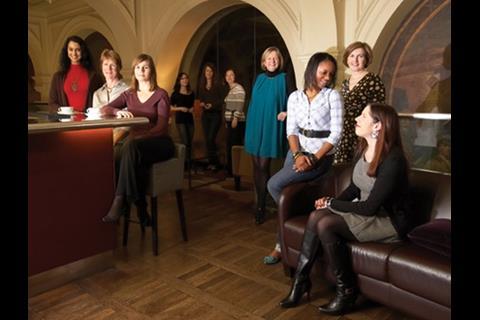
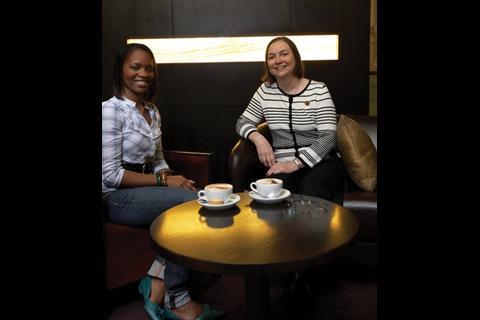
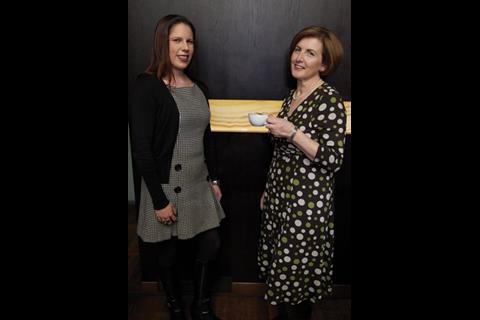
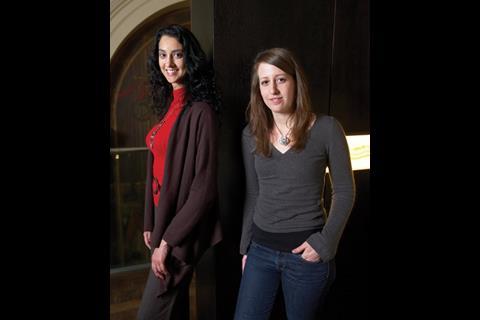
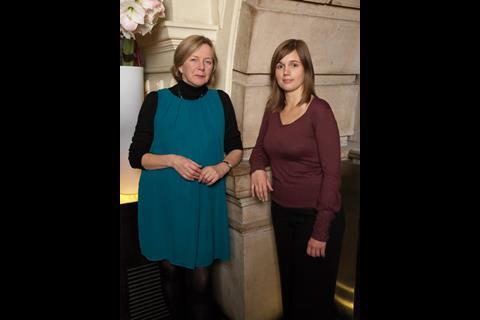







1 Readers' comment